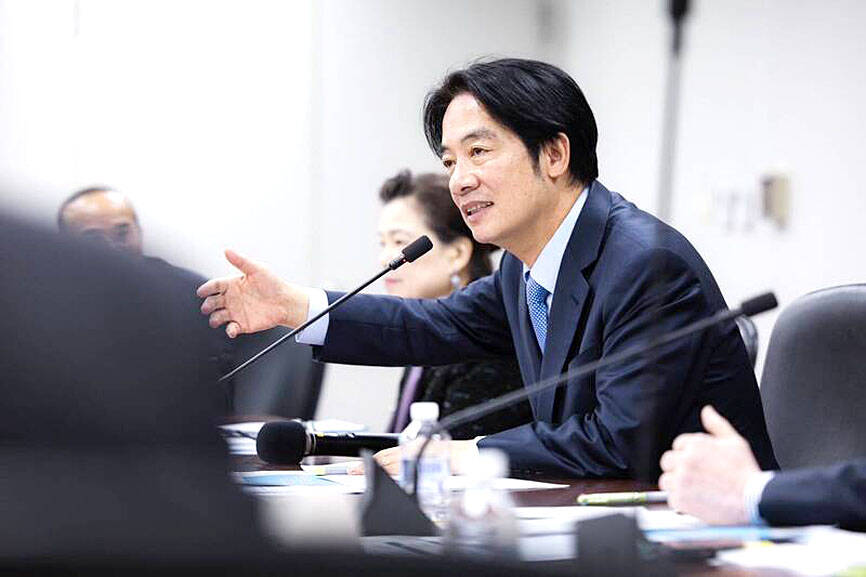The standing of international guests attending president-elect William Lai’s (賴清德) inauguration ceremony on May 20 would determine Beijing’s reaction to the event, including holding military exercises or dispatching a large number of aircraft to harass Taiwan, an expert said on Thursday.
“I expect things to possibly get worse in the lead-up to William Lai’s inauguration ... especially depending on who from outside Taiwan attends,” Thomas Shattuck, non-resident research fellow with the Global Taiwan Institute, told a seminar held by the institute.
High-level attendees might prompt China to hold military drills or large-scale aerial incursions, he said.

Photo: Chen Yun, Taipei Times
Beijing has this year launched relatively fewer large-scale aerial incursions in comparison with the past few years, he said.
It might be an attempt to avoid raising concerns about cross-strait stability in the run-up to Taiwan’s presidential election on Jan. 13, as alarming the public might sway voters toward Lai, he said.
Beijing might also turn its attention to a “new mechanism to coerce Taiwan at sea,” such as frequently sending China Coast Guard vessels to waters near Kinmen after an incident in which two Chinese fishers died while being pursued by a Taiwanese Coast Guard Administration vessel last month, he said.
By conducting regular patrols, drills and inspections, Beijing is “normalizing its presence” in disputed waters in preparation for taking control of the area, said Lee Sze-fung (李紫楓), a former analyst at the Canadian Ministry of Foreign Affairs’ Global Affairs Canada.
China is likely to prolong and expand its presence in the Taiwan Strait and would be “seizing effective control in the area in a very short, near future” if it is met with no “high pace, effective countermeasures,” she said.
When Beijing is able to exercise control, the “only step left is an invasion to take full control of the island and Taiwan itself,” she said.
The Chinese gray-zone tactics work as they exploit “the greatest weakness between liberal democracies,” which is “a lack of consensus on what constitutes war or a clear threshold of unacceptable behaviors,” she said.
Lee called for a “comprehensive approach of cross-domain deterrence” to facilitate discussions among democracies on countermeasures against Beijing.
To counter China’s coercive behavior, Taipei could look to Manila, which is “doing a very good job of publicizing it and creating international outrage,” Shattuck said.
Despite being much smaller in size and having limited resources, Taipei could use affordable drones to document Beijing’s aggression and use it to solicit support from international friends, who can in turn speak up for the nation and condemn such behavior at UN meetings or other occasions, he said.

Taiwan is to commence mass production of the Tien Kung (天弓, “Sky Bow”) III, IV and V missiles by the second quarter of this year if the legislature approves the government’s NT$1.25 trillion (US$39.78 billion) special defense budget, an official said yesterday. Commenting on condition of anonymity, a defense official with knowledge of the matter said that the advanced systems are expected to provide crucial capabilities against ballistic and cruise missiles for the proposed “T-Dome,” an advanced, multi-layered air defense network. The Tien Kung III is an air defense missile with a maximum interception altitude of 35km. The Tien Kung IV and V

The disruption of 941 flights in and out of Taiwan due to China’s large-scale military exercises was no accident, but rather the result of a “quasi-blockade” used to simulate creating the air and sea routes needed for an amphibious landing, a military expert said. The disruptions occurred on Tuesday and lasted about 10 hours as China conducted live-fire drills in the Taiwan Strait. The Civil Aviation Administration (CAA) said the exercises affected 857 international flights and 84 domestic flights, affecting more than 100,000 travelers. Su Tzu-yun (蘇紫雲), a research fellow at the government-sponsored Institute for National Defense and Security Research, said the air

Taiwan lacks effective and cost-efficient armaments to intercept rockets, making the planned “T-Dome” interception system necessary, two experts said on Tuesday. The concerns were raised after China’s military fired two waves of rockets during live-fire drills around Taiwan on Tuesday, part of two-day exercises code-named “Justice Mission 2025.” The first wave involved 17 rockets launched at 9am from Pingtan in China’s Fujian Province, according to Lieutenant General Hsieh Jih-sheng (謝日升) of the Office of the Deputy Chief of the General Staff for Intelligence at the Ministry of National Defense. Those rockets landed 70 nautical miles (129.6km) northeast of Keelung without flying over Taiwan,

A strong continental cold air mass is to bring pollutants to Taiwan from tomorrow, the Ministry of Environment said today, as it issued an “orange” air quality alert for most of the country. All of Taiwan except for Hualien and Taitung counties is to be under an “orange” air quality alert tomorrow, indicating air quality that is unhealthy for sensitive groups. In China, areas from Shandong to Shanghai have been enveloped in haze since Saturday, the ministry said in a news release. Yesterday, hourly concentrations of PM2.5 in these areas ranged from 65 to 160 micrograms per cubic meter (mg/m³), and pollutants were